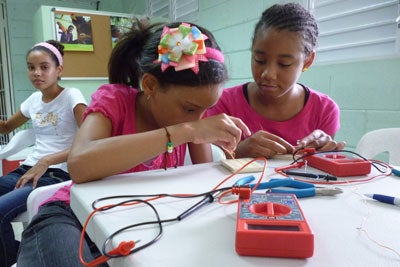Girls bridge the digital gender gap in Central America
Nearly 3,000 girls and youth across Costa Rica and the Dominican Republic are using technology and innovative strategies to achieve gender equality in male-dominated fields.Date:
“As women we can be whatever we want. I am going to be an engineer or an accountant because math [is] fun, because everything is mathematics,” said Helen Ulloa, an 11-year-old student from Santo Domingo, Dominican Republic, who participated in a math camp organized by the Centro de Investigación para la Acción Femenina (CIPAF) with the support of UN Women’s Fund for Gender Equality.

Helen was one of the 350 girls and female adolescents that participated in the first science and technology clubs ever organized in the Dominican Republic. Started in 2010 under the support of the Fund, these clubs provide interactive spaces to promote academic interest and train girls in the areas of science, technology, engineering, and math (STEM). Female adolescents and girls as young as 11 years old are taking classes in robotics, auto-mechanics, computer programing and electronics. The clubs are igniting young women’s interest in these traditionally male-dominated fields while boosting their self-esteem, leadership and collaborative work skills.
One of the key strategies is to familiarize girls with Information, Communication and Technologies (ICTs)-related knowledge and tools, and provide them with practical skills to be able to use them. This ensures they do not miss out on the opportunities for professional development and innovation of the digital revolution, while bridging the existing digital gender gap.
As highlighted by UN Women Executive Director, Phumzile Mlambo-Ngcuka in her opening address at ‘Mobile Learning Week 2015: Leveraging technology to empower women and girls’: “Given the youthfulness of the population in developing countries, technology can be used to leverage a demographic dividend as youth are keen and early adopters of technology.” Girls around the world are receiving early vocational ICT training and they are becoming activists, influencing their peers and communities.
UN Women’s Fund for Gender Equality grantee organizations work with girls to challenge gender stereotypes and achieve long-term change. Almost 40 per cent of the programmes supported by the Fund engage with youth as the main beneficiaries. With increased capacities and self-confidence from their early childhood, the new generations of women can grow up free from gender prejudices and become actors of their own empowerment in all spheres of life. The programmes often engage youth through sports, social media, advertisements and cultural events, including theatre performances and music. Thirteen per cent of the programmes use mentorship initiatives that are primarily targeted towards young women.

In Costa Rica, Fund grantee Sulá Batsú (which means creative spirit in the indigenous language Bri Bri) is encouraging school girls in impoverished rural areas to get involved in science and technology and ignite their peers’ interest in doing the same. The girls have filled the schools’ walls with colourful, eye-catching paintings that portray female scientists and convey messages such as “No matter how old you are, with courage and effort you can make big achievements.”
This initiative is also helping female students and graduates in technology become ICT entrepreneurs. With the slogan “Programamos en codigo femenino” (We program in female code), Sulá Batsú convened the first female “Hackathon” in Central America in 2014. Forty five adolescents and young women came together to develop software applications for mobile phones, tablets and computers that would help address problems faced by their rural communities such as early school dropout and teenage pregnancies.
Participant Ericka Ramírez, a fourth-year university student in computer engineering, has emerged as an active social entrepreneur, particularly invested in promoting education and preventing school dropouts. Along with her colleagues, she developed customized software to assist students with special needs and also developed a search app for textbooks that incorporated a gender perspective.
“I have learned about the importance of women in technology,” said Ms. Ramírez, after presenting her project to an international audience at Mobile Learning Week, organized by UN Women and UNESCO in Paris in February 2015. “I have understood how thanks to technology we can solve the issues that countries face … I try to get women involved in technology because we are all part of the change; of the solution.”
To date, the programme in Costa Rica has reached over 1,700 direct beneficiaries—including students, teachers, parents, ICT professionals and academics—while the programme in Dominican Republic has reached nearly 1,200.